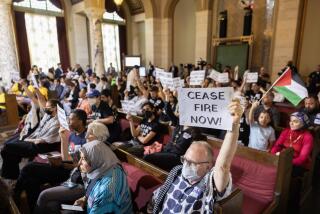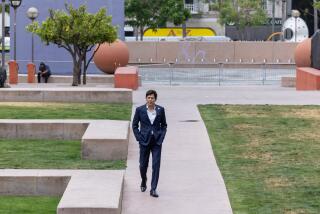Furor Over Farrakhan
- Share via
The contention that black leaders, including Mayor Tom Bradley, should have spoken out prior to Louis Farrakhan’s appearance at the Forum was extended by Marshall Grossman and David Lehrer (Letters, Oct. 27). The Jewish community has indicated, through various spokesmen, that it feels betrayed by the “strategy of silence” of black leaders. Because Jews have supported black causes, and particularly Bradley, there should have been acquiescence to their desire for a denouncement of Farrakhan prior to his speech. This, they infer, would have shown that Bradley and others did not share Farrakhan’s anti-Jewish sentiments.
Let’s analyze this theory. First of all, anyone who has even remotely followed the political career of Tom Bradley knows that he has a positive attitude toward Jews and all ethnic groups. Second, observers of political campaigns knew that Jews have been Bradley’s most generous supporters. Reason dictates that they would not have supported him if they had any doubt as to his attitude toward Jews. Third, Jews have supported black causes for many years. Again it is reasonable to suppose that they would not have done so had they been in doubt about the attitude of black leaders as a whole.
The above being a factual analysis of Jews’ awareness of black attitudes, then why was the Jewish community seeking to pressure Bradley and others into denouncing Farrakhan before he spoke? Why the display of indignation?
Presumably, denunciations by Bradley and other black leaders would have reassured the Jewish community and the people of Los Angeles that they did not share Farrakhan’s sentiments. But the Jewish community and all of Los Angeles already knew where Bradley stood, and, I am certain, had little doubt as to where the others stood. So who were the black leadership to reassure?
As a civil-rights activist for many years, I know that it is comforting to have your “friends” stand up and be counted. However, if your “friends” should determine for reasons of personal expediency that they cannot comply with your wishes,they should not be condemned.
I find myself becoming more and more dubious about the sincerity of the Jewish attitude toward blacks. I am not surprised at their reaction to the harsh and derogatory rhetoric of Farrakhan. We blacks are also very sensitive to expressions or actions that are directed toward us and demean our racial integrity. I am, however, somewhat surprised at what I sense to be emerging evidence that the Jewish attitude toward blacks is paternalistic and borders dangerously close to being an insulting “we call the tune, you dance” type of attitude.
This should not be so. If a relationship between ethnic groups is to endure, it must be established upon sincere regard for the concerns and worthy causes incumbent within each group’s aspirations. Each should respect the independence of the other and the other’s right to not see “eye to eye” on all issues.
For instance, Jews have spoken in opposition to admission quotas for colleges and universities that were designed to give preferential treatment and facilitate the admission of black applicants. Blacks have been disappointed that our Jewish friends found it necessary to take such a position, but it has not caused serious breaches in black-Jewish relations because we respect the right of our friends to exercise their options. Surely, admission quotas are a far more serious issue than whether or not to denounce Farrakhan prior to his speech. Very little damage, if any, was inflicted on the Jewish community by the strategy of silence. However, opposition to admission quotas by Jews may prove to have far-reaching effects on the opportunity for self-improvement and advancement among black young people.
Some black leaders did denounce Farrakhan prior to his speech. Others who did not, including Mayor Bradley, have expressed honest uncertainty as to whether or not they made the right decision. However, the issue has been blown all out of proportion.
In view of the fact that Jews and others know and have known the positions of the blacks who are being criticized, it is difficult to assess what results, positive or negative, would have materialized had the strategy of silence been abandoned. It will be well to lay aside the whole matter, for the continuation of the debate plays into the hands of those “dyed-in-the-wool” bigots, of all backgrounds, who would indeed delight in a complete breakdown of Jewish-black relations.
JOSEPH L. GRIFFIN
Los Angeles
Griffin is pastor of the Good Shepherd Baptist Church.
More to Read
Sign up for Essential California
The most important California stories and recommendations in your inbox every morning.
You may occasionally receive promotional content from the Los Angeles Times.













